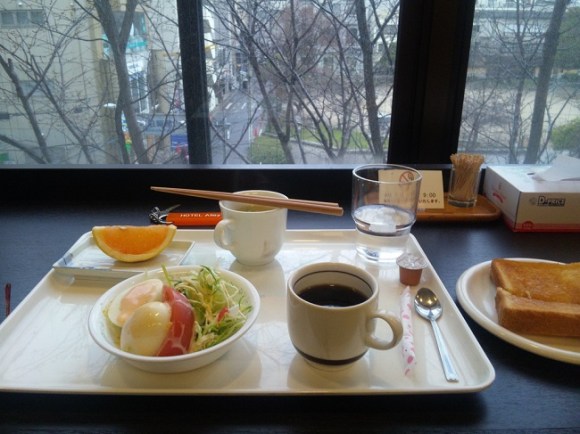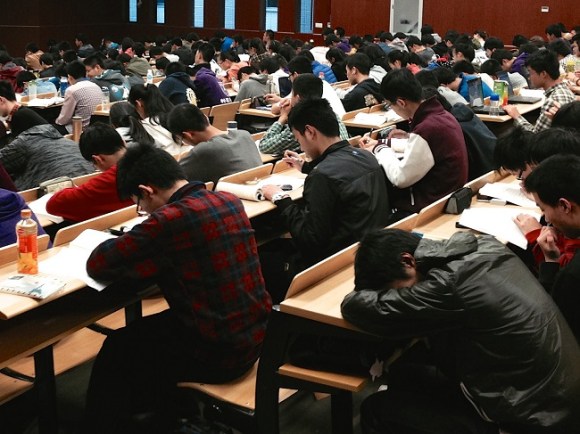
University means a lot of things to people, but most of us have the same initial thought when we receive that glorious acceptance letter: FREEDOM! You are rid of your parents, can ignore those pesky siblings and finally carve out your own space in the world. You get to experience all sorts of the highs and lows, like living on your own for the first time, cooking for yourself and being the only one who cares if you make it to class.
All the responsibility lies with the student; university is the time for coming of age and shaping the adult that you will be. Recently though, Japanese parents have become increasingly vocal about their concerns for their children and the fact that there are not many support systems in place to give the parents some peace of mind. Well, as it turns out, the universities are listening and bowing to parents’ wishes.
Programs that support incoming students at universities are a great idea and can go a long way to increasing student retention and graduation numbers. The new freedom and lifestyle can be extremely stressful for students, but it’s the parents in Japan who are the most concerned. They’re worried about whether their children are attending classes, eating properly and/or able to adapt to their new environment. Fear not, fretting fathers and mothers! Some Japanese universities are willing to calm your anxieties with some of the most over-protective programs you can think of. Here are the top four!
1. Smartphone applications to check your child’s attendance
Worried that your irresponsible child isn’t going to class regularly? There’s an app for that. At universities in the Kinki Region (Osaka, Kyoto, and Nara, etc.), many are turning to digital forms of taking attendance, which are promptly uploaded to a server where parents can access the information. Easy symbols are used to denote attendance records so parents can get all the information at a glance. “○”means the student attended, an “x” means they were absent, a “△” means they were tardy, and a “▽”means they left the class early.
2. Free or practically free breakfast
Breakfast is the most important meal of the day, but it’s hard telling that to a university student who can barely roll out of bed 10 minutes before their class starts. A clear incentive is to make the first meal of the day free, which some universities do, while others offer a breakfast for only 100 yen (US $0.83) which is still a pretty good deal. This program is an attempt to reassure parents that their children are getting enough sustenance to maintain a healthy body and mind while studying. What many people might not realize is that most universities in Japan don’t have on-campus dormitories and thus don’t force students to purchase a meal plan. So while breakfast might be on the house, lunch and dinner leave the students fending for themselves. Cup noodles, anyone?
3. First year university students attend a homeroom-like class
Homeroom in Japanese schools is a very important part of a student life. Attendance is recorded, the students’ well-being is noted and any important or disturbing news is announced. It fosters a sense of community in students that also makes it easy for teachers to keep tabs on their pupils. Things are extremely structured, so some parents are worried that their children might be having a hard time getting used to the completely new and unstructured university atmosphere.
In some universities, homeroom-style classes have been introduced where all the freshmen gather once or twice a week to do exactly the same things they did as little children. The “homeroom teacher” (read “annoyed professor”) consults their records on each individual’s attendance and test scores and gives students a talk if they need some encouragement.
4. A support system for students and parents for job hunting (AKA “Do you want someone to hold your hand?”)
The most stressful time in a Japanese university student’s life is when they have to start job hunting. It requires impeccably pressed suits, a number of stressful interviews and an almost equal number of disappointing results. However, most people see it as a rite of passage to adulthood. After spending two or three years on your own, it’s time to show the world what kind of person you are and get a job!
Needless to say, parents worry constantly about whether or not their offspring are doing all the right things necessary to get a good job at a good company. That puts extra pressure on the students, which in turn makes the parents worry even more.
To alleviate these pressures, universities are creating programs that will help guide students from the very first day of enrollment. Students and parents will be required to attend classes on job hunting together, and while it seems like this “nanny state” of affairs would cause more harm than good, it has actually garnered successful results thus far.
▼ All of this makes us want to flip the table!
We suspect that many students would say, “No way!” to practices like this at their university — except for the free breakfast, of course. But what about you? If you are a student, would any of these programs be of use to you? If you are a parent, would you use any of these programs if they were offered? Let us know in the comments below!
Source: Naver Matome
Top Image: Flickr/Dick Thomas Johnson






 Five tips for hosting a college-age Japanese student in your country
Five tips for hosting a college-age Japanese student in your country The top five surprising observations of a Japanese student visiting an American university
The top five surprising observations of a Japanese student visiting an American university University of Tokyo announces new department with all classes taught in English
University of Tokyo announces new department with all classes taught in English University lecturer calls out his lazy Japanese students, praises his hard-working Chinese ones
University lecturer calls out his lazy Japanese students, praises his hard-working Chinese ones Japanese educators want to allow students to use robot substitutes to attend school
Japanese educators want to allow students to use robot substitutes to attend school Cherry blossom forecasts map shows Japan’s OTHER sakura season is starting right now
Cherry blossom forecasts map shows Japan’s OTHER sakura season is starting right now We get our hands on some “Booby Ice Cream” from Kochi Prefecture
We get our hands on some “Booby Ice Cream” from Kochi Prefecture This gigantic judo dojo-sized hotel room will make you feel like royalty, but it’s disappearing soon
This gigantic judo dojo-sized hotel room will make you feel like royalty, but it’s disappearing soon Why you should visit Shizuoka, the green tea oasis in the middle of Japan’s golden route
Why you should visit Shizuoka, the green tea oasis in the middle of Japan’s golden route Yokai are descending upon Tokyo this spring in the latest immersive art experience
Yokai are descending upon Tokyo this spring in the latest immersive art experience Drawing a school girl leaping over a man firing a gun? There’s a reference book for that!
Drawing a school girl leaping over a man firing a gun? There’s a reference book for that! 10 crazy pizzas from Japan
10 crazy pizzas from Japan Japanese vending machine sells just one thing at this station
Japanese vending machine sells just one thing at this station How to make a lucky sushi roll with KFC fried chicken skin【SoraKitchen】
How to make a lucky sushi roll with KFC fried chicken skin【SoraKitchen】 Official English version of anime Your Name’s theme song sounds cool as Japanese original【Video】
Official English version of anime Your Name’s theme song sounds cool as Japanese original【Video】 Japan’s Naruto theme park now offering real-world version of Minato’s kunai ninja weapon
Japan’s Naruto theme park now offering real-world version of Minato’s kunai ninja weapon Japan has a new bar just for people thinking about quitting their jobs, and the drinks are free
Japan has a new bar just for people thinking about quitting their jobs, and the drinks are free New Studio Ghibli stamps leave an impression on your stationery…and your heart
New Studio Ghibli stamps leave an impression on your stationery…and your heart Japan cherry blossom forecast update moves up sakura dates for many parts of the country
Japan cherry blossom forecast update moves up sakura dates for many parts of the country Archfiend Hello Kitty appears as Sanrio launches new team-up with Yu-Gi-Oh【Pics】
Archfiend Hello Kitty appears as Sanrio launches new team-up with Yu-Gi-Oh【Pics】 Studio Ghibli turns My Neighbour Totoro characters into bag charms for everyday adventures
Studio Ghibli turns My Neighbour Totoro characters into bag charms for everyday adventures If you haven’t tried an antenna shop in Japan, you’re missing out
If you haven’t tried an antenna shop in Japan, you’re missing out Studio Ghibli releases Spirited Away bags in Japan, based on a mysterious festival
Studio Ghibli releases Spirited Away bags in Japan, based on a mysterious festival Morning-after pill finally available in Japan without a prescription, must be taken at pharmacy
Morning-after pill finally available in Japan without a prescription, must be taken at pharmacy Starbucks Japan releases new drinkware and goods for Valentine’s Day
Starbucks Japan releases new drinkware and goods for Valentine’s Day Japan releases first official sakura cherry blossom forecast for 2026
Japan releases first official sakura cherry blossom forecast for 2026 10 times to avoid traveling in Japan in 2026
10 times to avoid traveling in Japan in 2026 Starbucks Japan releases new Frappuccino and latte for Valentine’s Day
Starbucks Japan releases new Frappuccino and latte for Valentine’s Day Our 52-year-old pole dancing reporter shares his tips for achieving your New Year’s exercise goal
Our 52-year-old pole dancing reporter shares his tips for achieving your New Year’s exercise goal China’s don’t-go-to-Japan warning looks to be affecting tourist crowds on Miyajima
China’s don’t-go-to-Japan warning looks to be affecting tourist crowds on Miyajima Studio Ghibli releases new “komorebi” plush toys from Princess Mononoke and Spirited Away
Studio Ghibli releases new “komorebi” plush toys from Princess Mononoke and Spirited Away Ramen restaurant’s English menu prices are nearly double its Japanese ones, denies discriminating
Ramen restaurant’s English menu prices are nearly double its Japanese ones, denies discriminating Survey asks foreign tourists what bothered them in Japan, more than half gave same answer
Survey asks foreign tourists what bothered them in Japan, more than half gave same answer Japan’s human washing machines will go on sale to general public, demos to be held in Tokyo
Japan’s human washing machines will go on sale to general public, demos to be held in Tokyo We deeply regret going into this tunnel on our walk in the mountains of Japan
We deeply regret going into this tunnel on our walk in the mountains of Japan Studio Ghibli releases Kodama forest spirits from Princess Mononoke to light up your home
Studio Ghibli releases Kodama forest spirits from Princess Mononoke to light up your home Major Japanese hotel chain says reservations via overseas booking sites may not be valid
Major Japanese hotel chain says reservations via overseas booking sites may not be valid Put sesame oil in your coffee? Japanese maker says it’s the best way to start your day【Taste test】
Put sesame oil in your coffee? Japanese maker says it’s the best way to start your day【Taste test】 No more using real katana for tourism activities, Japan’s National Police Agency says
No more using real katana for tourism activities, Japan’s National Police Agency says Starbucks Japan reveals new sakura drinkware collection, inspired by evening cherry blossoms
Starbucks Japan reveals new sakura drinkware collection, inspired by evening cherry blossoms Updated cherry blossom forecast shows extra-long sakura season for Japan this year
Updated cherry blossom forecast shows extra-long sakura season for Japan this year What it’s really like to live in a women’s dormitory at a Japanese university
What it’s really like to live in a women’s dormitory at a Japanese university Japanese reporter interviews college students to find out why anyone would study Japanese
Japanese reporter interviews college students to find out why anyone would study Japanese Japanese university students reveal the part-time jobs they’d most like to have
Japanese university students reveal the part-time jobs they’d most like to have Number of foreign students in Japan hits record high, one country accounts for over 35 percent
Number of foreign students in Japan hits record high, one country accounts for over 35 percent Mie University to add “ninja section” on entrance exams
Mie University to add “ninja section” on entrance exams Meiji Gakuen University gives all students a 50,000 yen grant to offset the cost of digital classes
Meiji Gakuen University gives all students a 50,000 yen grant to offset the cost of digital classes Japanese university “otaku class” has strict requirements: “You must watch 20 anime per week”
Japanese university “otaku class” has strict requirements: “You must watch 20 anime per week” Japanese university seating plan meme submitted to web for approval
Japanese university seating plan meme submitted to web for approval Kyoto University students let loose at cosplay graduation ceremony【Photos】
Kyoto University students let loose at cosplay graduation ceremony【Photos】 Tokyo University of the Arts to offer graduate program in video game design next year
Tokyo University of the Arts to offer graduate program in video game design next year Japanese ministers call for reform of company hiring practices that focus on new graduates
Japanese ministers call for reform of company hiring practices that focus on new graduates Japanese university tries to win hearts of enrolling students with elaborate opening ceremony
Japanese university tries to win hearts of enrolling students with elaborate opening ceremony Japanese university English teacher fights student misbehaviour with eccentric new rulebook
Japanese university English teacher fights student misbehaviour with eccentric new rulebook Japanese teacher simply asks to be treated like a human being
Japanese teacher simply asks to be treated like a human being Japanese middle school student drives cram school teacher nuts with delusional rantings
Japanese middle school student drives cram school teacher nuts with delusional rantings
Leave a Reply